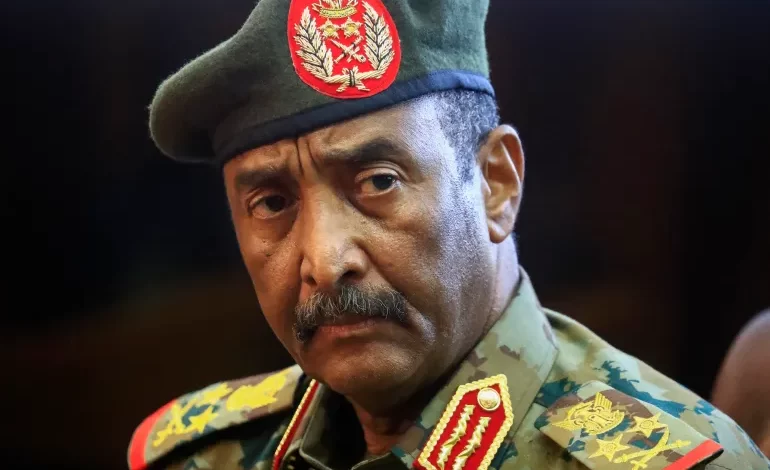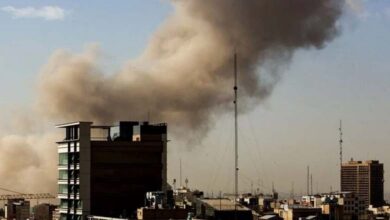The stubbornness of General Al-Burhan threatens to undermine the mediation efforts of IGAD to end the conflict

The Sudanese army delegation boycotts the meeting of the Quadripartite Committee of the Intergovernmental Authority on Development (IGAD) in Addis Ababa, citing Khartoum’s objection to Kenya’s presidency of the talks
The Quad Committee of the IGAD Governmental Authority for Development affirmed in a concluding statement after the meeting held in Addis Ababa today, Monday, with the participation of heads and representatives of international organizations, including the United Nations, in addition to Youssef Azat, representing the Rapid Support Forces, that a “military solution” cannot be a way out of the ongoing crisis in Sudan.
The Sudanese army interrupted the meeting, the latest indication of the obstinacy demonstrated by the commander of the Sudanese Armed Forces, Abdel Fattah Al-Burhan, towards all mediation initiatives to end the conflict and prevent its extension to the neighboring countries, at a time when the United Nations warned that the country is on the brink of a comprehensive civil war.
President Uhuru Kenyatta of Kenya chaired the Quad IGAD Committee delegation in talks aimed at reaching an agreement to ensure the cessation of hostilities in Sudan, facilitate the delivery of humanitarian aid, and take concrete steps to support a peaceful transition, as reported by Kenyan Broadcasting Corporation (KBC).
On Thursday, Sudan’s Foreign Minister Ali Al-Sadig welcomed IGAD’s initiative to resolve the crisis in his country, provided that consultations take place with the Sudanese government. However, he reiterated Khartoum’s objection to “Kenya’s presidency of the Quad IGAD Committee” regarding Sudan, considering that “Nairobi is guided in dealing with the Sudanese issue by international initiatives, which does not serve the principle of African solutions to the problems of the continent.”
In turn, a Sudanese military source stated that the Armed Forces delegation in Addis Ababa interrupted the committee meetings in protest against Kenya’s presidency. The source, preferring not to mention his name, added that “President Uhuru Kenyatta is blatantly biased in favor of the Rapid Support Forces.” He explained that “the agenda of the committee’s meeting tends to recognize the Rapid Support Forces as a parallel party to the Sudanese army, which is a rejected matter in its entirety and detail.”
Sudan’s Ministry of Foreign Affairs stated in a statement that “the Sudanese government has decided to send a delegation to participate in the meetings of the Quad Committee emanating from the IGAD organization, which is scheduled to be held today, Monday, in Addis Ababa,” adding that this comes “by the conviction of the Sudanese government and its initial position that war should not be a means to achieve goals and in response to a gracious invitation from Ethiopian Prime Minister Abiy Ahmed.” The statement continued, “Our delegation has already arrived in Addis Ababa this morning, but unfortunately, it became clear that the presidency of the Quad Committee has not been changed, although the Sudanese government has requested a change in the presidency of President Uhuru Kenyatta, the President of the Republic of Kenya, for the Quad Committee since the Djibouti Summit.”
Earlier today, the Ethiopian official broadcasting corporation “FANA” revealed the participation of heads of state, governments, and representatives of international organizations in the meeting. It stated that, in addition to the President of Kenya, the Foreign Minister of Djibouti, Mohamed Ali, as well as Sudanese politicians and a delegation from the Rapid Support Forces, are participating. The final statement of the meeting was issued, which was read by President Uhuru Kenyatta, despite the Sudanese army’s announcement of its boycott of the meeting and the withdrawal of the Sudanese government delegation present in Addis Ababa, after submitting a request to change the presidency of Kenya for the IGAD Quad Committee.
The statement focused on the need for the conflicting parties in Sudan to commit to an unconditional ceasefire and to agree on the establishment of a humanitarian zone to facilitate the entry of aid. It stressed that “there is no military solution to the conflict in Sudan” and called for a direct meeting between the leaders of the warring parties aimed at “immediately stopping the violence and signing an unconditional and indefinite agreement.” It acknowledged the ongoing efforts of the United Nations, regional and international partners, including the United States and Saudi Arabia, to achieve peace in Sudan.
In this context, the statement expressed the concerns of the participants in the meeting about the impact of the ongoing war, which has claimed the lives of thousands of people to date and has displaced nearly 3 million individuals, including 2.2 million internally displaced persons and approximately 615,000 refugees who have crossed the borders into neighboring countries. The statement also highlighted the risks of escalating conflict and repeated violations of various ceasefire agreements, as well as the spread of violence beyond the capital Khartoum to other parts of Sudan, including Darfur and Kordofan.
The statement called on neighboring countries to intensify efforts to deliver humanitarian aid and take necessary measures to facilitate and remove any logistical barriers to the delivery of humanitarian assistance, including visa and customs requirements.
In this context, the statement pointed out the absence of the Sudanese army from today’s meeting, which the participants described as a “regrettable absence despite the invitation and confirmation of attendance,” noting the upcoming meeting in Sudan, hosted by Egypt on July 13th. IGAD welcomed in its statement the “complementary role that this initiative will play in supporting the common goals for peace and stability in Sudan.”
The talks were attended by Ethiopian Prime Minister Abiy Ahmed, Djibouti’s Foreign Minister Mahmoud Ali Youssouf, and Benjamin Bol Mel, an advisor to the President of South Sudan. Representatives from the United Nations Office for the Coordination of Humanitarian Affairs, the European Union, Egypt, Saudi Arabia, the United Arab Emirates, the United States, and the United Kingdom also attended the meeting. IGAD announced on June 12th the formation of a quad committee chaired by Kenya and South Sudan, including Ethiopia and Somalia, to address the crisis in Sudan. IGAD is a quasi-regional African governmental organization established in 1969, headquartered in Djibouti, and also includes Ethiopia, Kenya, Uganda, Somalia, Eritrea, Sudan, and South Sudan.
The Rapid Support Forces stated that they were “surprised” by the Sudanese army delegation’s boycott of the first session of the IGAD quad committee meetings in Addis Ababa, citing “baseless and subjective excuses,” despite their arrival in the Ethiopian capital.
In a statement, they stated that “the boycott of the IGAD meeting by the army delegation is in line with the approach of the extremist defunct regime (former President Omar Al-Bashir’s regime), which has caused Sudan to experience its greatest regional and international isolation in its history.” They added, “This irresponsible behavior reveals that the decision within the military institution is hijacked and that multiple decision-making centers are seeking to prolong the duration of the war and obstruct the commendable efforts made by Sudan’s brothers and friends in its regional and international environment.”
The Rapid Support Forces considered their participation in the Addis Ababa meeting as “a commitment to the need to reach a peaceful solution that leads to an immediate cessation of the war, paves the way for a comprehensive political dialogue addressing the roots of the Sudanese crisis, and ensures the return of civilian democratic rule and the complete withdrawal of the military institution from political work.”
In a related context, the US Department of State stated on Sunday that Assistant Secretary of State for African Affairs Molly Feehery would travel to Addis Ababa today, Monday, for a two-day visit to meet with African leaders and Sudanese civilians to discuss how to end the conflict in Sudan. The US Department of State called on the Sudanese Armed Forces and the Rapid Support Forces to “immediately cease fighting, return to the barracks, and adhere to their obligations under international humanitarian law and international human rights law, and allow unhindered access for humanitarian aid to meet the urgent needs of civilians.”
Additionally, it stated that the Assistant Secretary of State would meet with Sudanese civilians and senior representatives from regional governments and the Intergovernmental Authority on Development (IGAD) for Eastern Africa, and the African Union Commission.
The United Nations Under-Secretary-General for Humanitarian Affairs, Mark Lowcock, said on Monday that Sudan is experiencing a “brutal civil war” of the worst kind. Lowcock added in a statement to the Associated Press that “the world needs a new forum for talks aimed at achieving a ceasefire in Sudan.”
The Sudanese army, led by Abdel Fattah al-Burhan, and the Rapid Support Forces, led by Mohamed Hamdan Dagalo “Hemetti,” have exchanged accusations of initiating the fighting since mid-April and committing violations during a series of ceasefires that have failed to end the clashes, resulting in more than 3,000 deaths, mostly civilians, and over 2.8 million displaced individuals inside and outside the country, according to the Ministry of Health and the United Nations.
Among the commanders, there are disagreements, including the timeline for implementing a proposed merger of the Rapid Support Forces into the army, which is a key provision in an expected agreement to transfer power during the transitional period to civilians. Al-Burhan, when allied with Hemetti, imposed measures in 2021, including dissolving the Council of Ministers and the Transitional Sovereign Council.
Opponents considered these actions as a “military coup” against the transitional period that began after the removal of Omar al-Bashir from the presidency (1989-2019), while al-Burhan stated that his actions aimed to “correct the course of the transitional period” and promised to restore power to civilians through elections or national consensus.











